互联网翻译
- 格式:ppt
- 大小:3.20 MB
- 文档页数:43
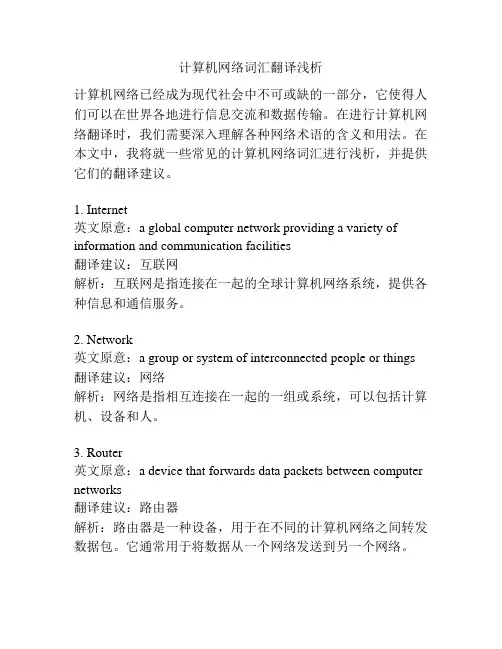
计算机网络词汇翻译浅析计算机网络已经成为现代社会中不可或缺的一部分,它使得人们可以在世界各地进行信息交流和数据传输。
在进行计算机网络翻译时,我们需要深入理解各种网络术语的含义和用法。
在本文中,我将就一些常见的计算机网络词汇进行浅析,并提供它们的翻译建议。
1. Internet英文原意:a global computer network providing a variety of information and communication facilities翻译建议:互联网解析:互联网是指连接在一起的全球计算机网络系统,提供各种信息和通信服务。
2. Network英文原意:a group or system of interconnected people or things 翻译建议:网络解析:网络是指相互连接在一起的一组或系统,可以包括计算机、设备和人。
3. Router英文原意:a device that forwards data packets between computer networks翻译建议:路由器解析:路由器是一种设备,用于在不同的计算机网络之间转发数据包。
它通常用于将数据从一个网络发送到另一个网络。
4. Ethernet英文原意:a system for connecting a number of computer systems to form a local area network翻译建议:以太网解析:以太网是一种将多台计算机系统连接在一起形成局域网的系统。
5. Firewall英文原意:a network security system that monitors and controls incoming and outgoing network traffic翻译建议:防火墙解析:防火墙是一种网络安全系统,用于监控和控制进出网络的流量。
6. Server英文原意:a computer or computer program that manages access to a centralized resource or service翻译建议:服务器解析:服务器是一台计算机或计算机程序,用于管理对集中资源或服务的访问。
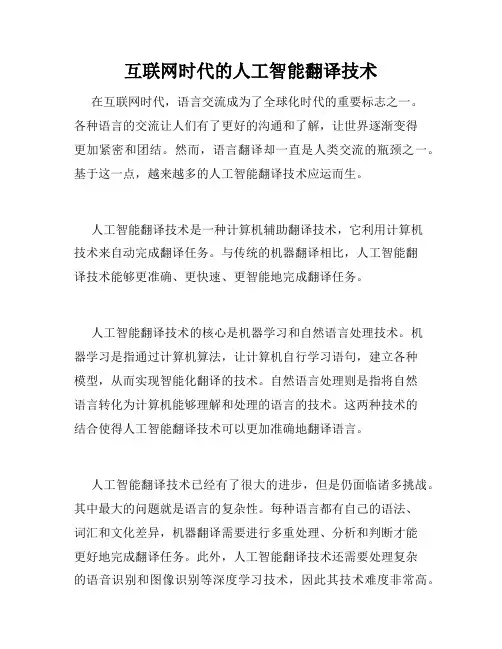
互联网时代的人工智能翻译技术在互联网时代,语言交流成为了全球化时代的重要标志之一。
各种语言的交流让人们有了更好的沟通和了解,让世界逐渐变得更加紧密和团结。
然而,语言翻译却一直是人类交流的瓶颈之一。
基于这一点,越来越多的人工智能翻译技术应运而生。
人工智能翻译技术是一种计算机辅助翻译技术,它利用计算机技术来自动完成翻译任务。
与传统的机器翻译相比,人工智能翻译技术能够更准确、更快速、更智能地完成翻译任务。
人工智能翻译技术的核心是机器学习和自然语言处理技术。
机器学习是指通过计算机算法,让计算机自行学习语句,建立各种模型,从而实现智能化翻译的技术。
自然语言处理则是指将自然语言转化为计算机能够理解和处理的语言的技术。
这两种技术的结合使得人工智能翻译技术可以更加准确地翻译语言。
人工智能翻译技术已经有了很大的进步,但是仍面临诸多挑战。
其中最大的问题就是语言的复杂性。
每种语言都有自己的语法、词汇和文化差异,机器翻译需要进行多重处理、分析和判断才能更好地完成翻译任务。
此外,人工智能翻译技术还需要处理复杂的语音识别和图像识别等深度学习技术,因此其技术难度非常高。
然而,人工智能翻译技术的优势远大于不足。
一方面,它可以更好地解决语言交流的问题,让人们更加便利地进行国际间的交流和合作。
另一方面,在全球化时代,语言学习成为了许多人的必修课,但是学习一门新语言需要花费大量的时间和精力。
有了人工智能翻译技术,人们便可以更快地了解和会话别的语言。
同时,还可以帮助人们更好地理解不同语言背后的文化差异,加深对世界文化多样性的认知和理解。
近年来,人工智能翻译技术在各个领域的应用越来越广泛。
在旅游、贸易、外交、商务等领域,人工智能翻译技术可以帮助人们快速地进行语言交流,解决国际交流过程中的语言障碍问题。
在教育领域,人工智能翻译技术也可以为学习者提供更多的语言学习资源,让学习者更好地了解和掌握一门外语。
总之,随着互联网的不断发展和全球化时代的到来,人工智能翻译技术的应用前景无限,它不仅可以为人们提供更好的语言交流环境,更是对推进文化多样化和促进世界和平发展具有巨大的作用。
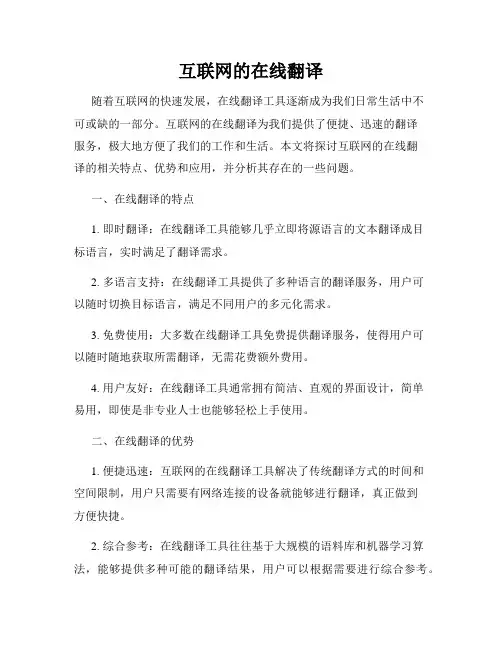
互联网的在线翻译随着互联网的快速发展,在线翻译工具逐渐成为我们日常生活中不可或缺的一部分。
互联网的在线翻译为我们提供了便捷、迅速的翻译服务,极大地方便了我们的工作和生活。
本文将探讨互联网的在线翻译的相关特点、优势和应用,并分析其存在的一些问题。
一、在线翻译的特点1. 即时翻译:在线翻译工具能够几乎立即将源语言的文本翻译成目标语言,实时满足了翻译需求。
2. 多语言支持:在线翻译工具提供了多种语言的翻译服务,用户可以随时切换目标语言,满足不同用户的多元化需求。
3. 免费使用:大多数在线翻译工具免费提供翻译服务,使得用户可以随时随地获取所需翻译,无需花费额外费用。
4. 用户友好:在线翻译工具通常拥有简洁、直观的界面设计,简单易用,即使是非专业人士也能够轻松上手使用。
二、在线翻译的优势1. 便捷迅速:互联网的在线翻译工具解决了传统翻译方式的时间和空间限制,用户只需要有网络连接的设备就能够进行翻译,真正做到方便快捷。
2. 综合参考:在线翻译工具往往基于大规模的语料库和机器学习算法,能够提供多种可能的翻译结果,用户可以根据需要进行综合参考。
3. 专业术语支持:许多在线翻译工具提供了特定领域的专业术语支持,为专业人士提供了更准确、可靠的翻译结果。
4. 多种文本类型支持:在线翻译工具不仅支持常见的文本翻译,还可以处理电子邮件、文档、网页等多种类型的文本翻译需求。
三、在线翻译的应用1. 跨语言交流:在线翻译工具方便了不同语言的人们进行交流,为国际贸易、旅游、学术交流等领域提供了更广阔的机会。
2. 学习辅助:在线翻译工具可以帮助学生在学习外语时及时翻译不懂的单词或句子,提高学习效率。
3. 文件翻译:在线翻译工具可以快速翻译各类文档,提高工作效率,节省时间。
4. 资讯获取:在线翻译工具能够帮助用户翻译海外新闻、文章等信息,了解全球动态。
然而,虽然在线翻译工具在我们的生活中发挥着重要作用,但其仍然存在一些问题。
一是翻译结果的准确性。
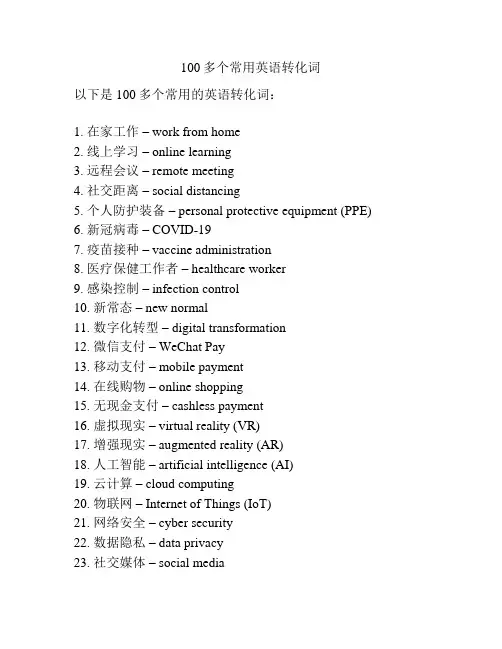
100多个常用英语转化词以下是100多个常用的英语转化词:1. 在家工作– work from home2. 线上学习– online learning3. 远程会议– remote meeting4. 社交距离– social distancing5. 个人防护装备– personal protective equipment (PPE)6. 新冠病毒– COVID-197. 疫苗接种– vaccine administration8. 医疗保健工作者– healthcare worker9. 感染控制– infection control10. 新常态– new normal11. 数字化转型– digital transformation12. 微信支付– WeChat Pay13. 移动支付– mobile payment14. 在线购物– online shopping15. 无现金支付– cashless payment16. 虚拟现实– virtual reality (VR)17. 增强现实– augmented reality (AR)18. 人工智能– artificial intelligence (AI)19. 云计算– cloud computing20. 物联网– Internet of Things (IoT)21. 网络安全– cyber security22. 数据隐私– data privacy23. 社交媒体– social media24. 数字营销– digital marketing25. 网络营销– online marketing26. 电子商务– e-commerce27. 可持续发展– sustainable development28. 绿色能源– green energy29. 循环经济– circular economy30. 生态友好– eco-friendly31. 大数据– big data32. 云存储– cloud storage33. 人脸识别– facial recognition34. 身份验证– identity verification35. 数据分析– data analysis36. 人工智能助手– AI assistant37. 虚拟助手– virtual assistant38. 智能家居– smart home39. 智能城市– smart city40. 智能交通– smart transportation41. 电子健康记录– electronic health record (EHR)42. 电子钱包– e-wallet43. 远程办公– remote work44. 在线协作– online collaboration45. 云会议– cloud meeting46. 数字签名– digital signature47. 电子签名– electronic signature48. 数字化学习– digital learning49. 虚拟学习– virtual learning50. 宽带互联网– broadband internet51. 无线网络– wireless network52. 电子邮件– email53. 动态驱动器– flash drive54. 数字相机– digital camera55. 蓝牙耳机– Bluetooth headphones56. 触屏设备– touch screen device57. 可穿戴设备– wearable device58. 视频会议– video conference59. 在线支付– online payment60. 科技创新– technological innovation61. 数据保护– data protection62. 电子商务平台– e-commerce platform63. 电子书籍– e-book64. 在线娱乐– online entertainment65. 人脑计算– brain-computer interface (BCI)66. 无人驾驶– autonomous driving67. 3D打印– 3D printing68. 虚拟货币– virtual currency69. 科技公司– technology company70. 网红– internet celebrity71. 视频分享– video sharing72. 在线音乐– online music73. 实时定位– real-time location74. 网购– online shopping75. 电子游戏– video game76. 自助服务– self-service77. 远程医疗– telemedicine78. 电子票务– e-ticketing79. 无线充电– wireless charging80. 电动汽车– electric vehicle (EV)81. 生物识别– biometric identification82. 智能手表– smartwatch83. 无人机– drone84. 虚拟帮手– virtual assistant85. 数码产品– digital products86. 国际化– internationalization87. 数据中心– data center88. 电子证照– electronic license89. 智能监控– intelligent surveillance90. 电子支付– electronic payment91. 电子商务平台– e-commerce platform92. 电子合同– electronic contract93. 数字货币– digital currency94. 无线耳机– wireless earphones95. 高科技产业– high-tech industry96. 电子竞技– e-sports97. 移动应用– mobile application98. 虚拟私人网络– virtual private network (VPN)99. 电子货币– e-currency100. 虚拟课堂– virtual classroom希望对你有帮助!。
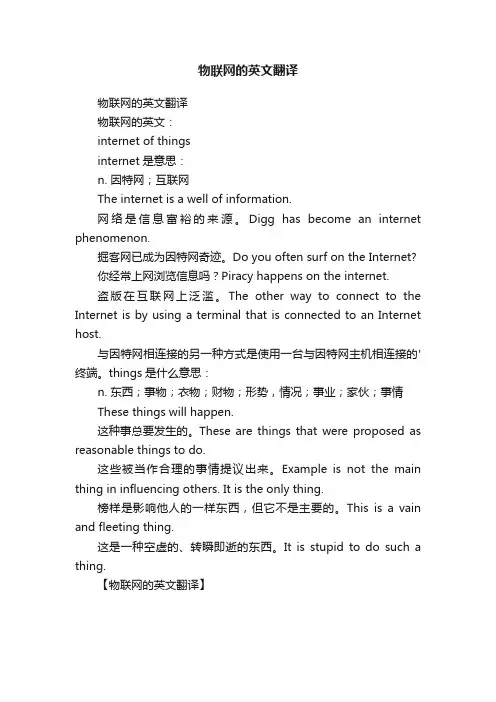
物联网的英文翻译物联网的英文翻译物联网的英文:internet of thingsinternet是意思:n. 因特网;互联网The internet is a well of information.网络是信息富裕的来源。
Digg has become an internet phenomenon.掘客网已成为因特网奇迹。
Do you often surf on the Internet?你经常上网浏览信息吗?Piracy happens on the internet.盗版在互联网上泛滥。
The other way to connect to the Internet is by using a terminal that is connected to an Internet host.与因特网相连接的另一种方式是使用一台与因特网主机相连接的'终端。
things是什么意思:n. 东西;事物;衣物;财物;形势,情况;事业;家伙;事情These things will happen.这种事总要发生的。
These are things that were proposed as reasonable things to do.这些被当作合理的事情提议出来。
Example is not the main thing in influencing others. It is the only thing.榜样是影响他人的一样东西,但它不是主要的。
This is a vain and fleeting thing.这是一种空虚的、转瞬即逝的东西。
It is stupid to do such a thing.【物联网的英文翻译】。
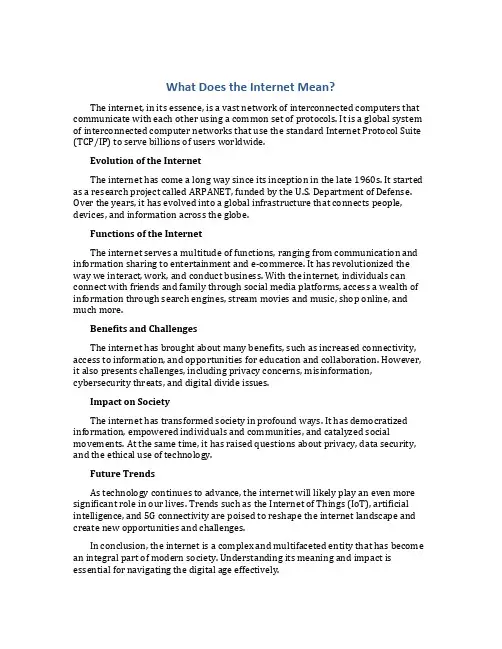
What Does the Internet Mean?The internet, in its essence, is a vast network of interconnected computers that communicate with each other using a common set of protocols. It is a global system of interconnected computer networks that use the standard Internet Protocol Suite (TCP/IP) to serve billions of users worldwide.Evolution of the InternetThe internet has come a long way since its inception in the late 1960s. It started as a research project called ARPANET, funded by the U.S. Department of Defense. Over the years, it has evolved into a global infrastructure that connects people, devices, and information across the globe.Functions of the InternetThe internet serves a multitude of functions, ranging from communication and information sharing to entertainment and e-commerce. It has revolutionized the way we interact, work, and conduct business. With the internet, individuals can connect with friends and family through social media platforms, access a wealth of information through search engines, stream movies and music, shop online, and much more.Benefits and ChallengesThe internet has brought about many benefits, such as increased connectivity, access to information, and opportunities for education and collaboration. However, it also presents challenges, including privacy concerns, misinformation, cybersecurity threats, and digital divide issues.Impact on SocietyThe internet has transformed society in profound ways. It has democratized information, empowered individuals and communities, and catalyzed social movements. At the same time, it has raised questions about privacy, data security, and the ethical use of technology.Future TrendsAs technology continues to advance, the internet will likely play an even more significant role in our lives. Trends such as the Internet of Things (IoT), artificial intelligence, and 5G connectivity are poised to reshape the internet landscape and create new opportunities and challenges.In conclusion, the internet is a complex and multifaceted entity that has become an integral part of modern society. Understanding its meaning and impact is essential for navigating the digital age effectively.。
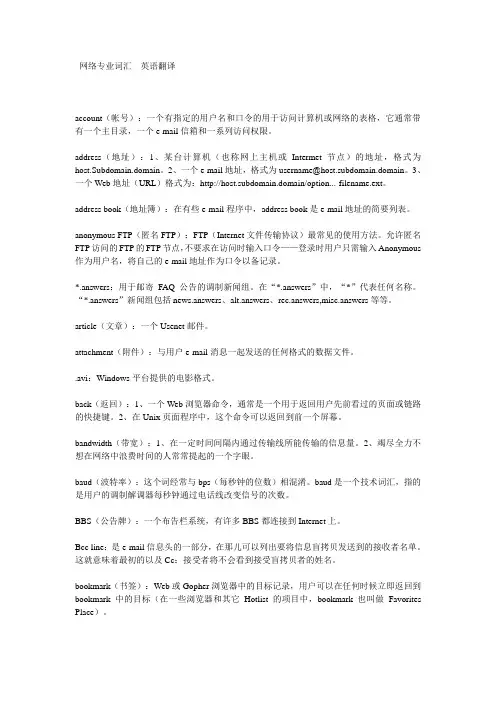
网络专业词汇英语翻译account(帐号):一个有指定的用户名和口令的用于访问计算机或网络的表格,它通常带有一个主目录,一个e-mail信箱和一系列访问权限。
address(地址):1、某台计算机(也称网上主机或Intermet节点)的地址,格式为host.Subdomain.domain。
2、一个e-mail地址,格式为username@host.subdomain.domain。
3、一个Web地址(URL)格式为:http://host.subdomain.domain/option...-filename.ext。
address book(地址簿):在有些e-mail程序中,address book是e-mail地址的简要列表。
anonymous FTP(匿名FTP):FTP(Internet文件传输协议)最常见的使用方法。
允许匿名FTP访问的FTP的FTP节点,不要求在访问时输入口令——登录时用户只需输入Anonymous 作为用户名,将自己的e-mail地址作为口令以备记录。
*.answers:用于邮寄FAQ公告的调制新闻组。
在“*.answers”中,“*”代表任何名称。
“*.answers”新闻组包括news.answers、alt.answers、rec.answers,misc.answers等等。
article(文章):一个Usenet邮件。
attachment(附件):与用户e-mail消息一起发送的任何格式的数据文件。
.avi:Windows平台提供的电影格式。
back(返回):1、一个Web浏览器命令,通常是一个用于返回用户先前看过的页面或链路的快捷键。
2、在Unix页面程序中,这个命令可以返回到前一个屏幕。
bandwidth(带宽):1、在一定时间间隔内通过传输线所能传输的信息量。
2、竭尽全力不想在网络中浪费时间的人常常提起的一个字眼。
baud(波特率):这个词经常与bps(每秒钟的位数)相混淆。
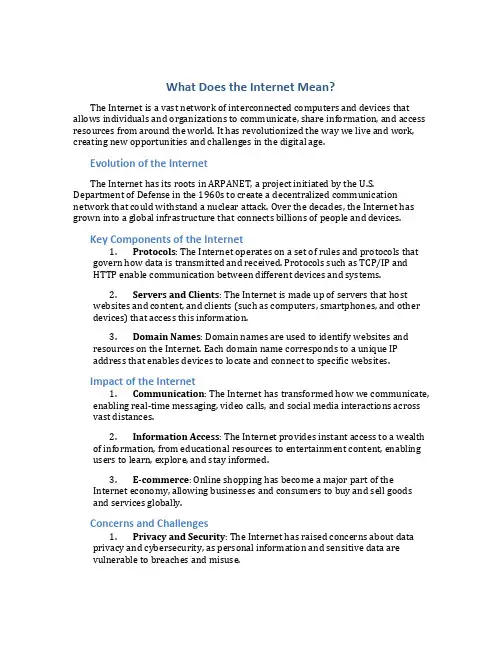
What Does the Internet Mean?The Internet is a vast network of interconnected computers and devices that allows individuals and organizations to communicate, share information, and access resources from around the world. It has revolutionized the way we live and work, creating new opportunities and challenges in the digital age.Evolution of the InternetThe Internet has its roots in ARPANET, a project initiated by the U.S. Department of Defense in the 1960s to create a decentralized communication network that could withstand a nuclear attack. Over the decades, the Internet has grown into a global infrastructure that connects billions of people and devices.Key Components of the Internet1.Protocols: The Internet operates on a set of rules and protocols thatgovern how data is transmitted and received. Protocols such as TCP/IP andHTTP enable communication between different devices and systems.2.Servers and Clients: The Internet is made up of servers that hostwebsites and content, and clients (such as computers, smartphones, and other devices) that access this information.3.Domain Names: Domain names are used to identify websites andresources on the Internet. Each domain name corresponds to a unique IPaddress that enables devices to locate and connect to specific websites.Impact of the Internetmunication: The Internet has transformed how we communicate,enabling real-time messaging, video calls, and social media interactions across vast distances.rmation Access: The Internet provides instant access to a wealthof information, from educational resources to entertainment content, enabling users to learn, explore, and stay informed.3.E-commerce: Online shopping has become a major part of theInternet economy, allowing businesses and consumers to buy and sell goodsand services globally.Concerns and Challenges1.Privacy and Security: The Internet has raised concerns about dataprivacy and cybersecurity, as personal information and sensitive data arevulnerable to breaches and misuse.2.Digital Divide: Not everyone has equal access to the Internet, leadingto disparities in information access, education, and economic opportunities.3.Misinformation and Manipulation: The Internet has been abreeding ground for fake news, misinformation, and online manipulation,raising questions about the reliability of information online.Future of the InternetAs technology continues to evolve, the Internet will play an even larger role in shaping our lives and societies. Innovations such as the Internet of Things, artificial intelligence, and virtual reality are poised to transform how we interact with the digital world.In conclusion, the Internet is a dynamic and ever-expanding network that has redefined how we connect, communicate, and collaborate in the modern era. Understanding its impact and potential is essential for navigating the opportunities and challenges of the digital age.。
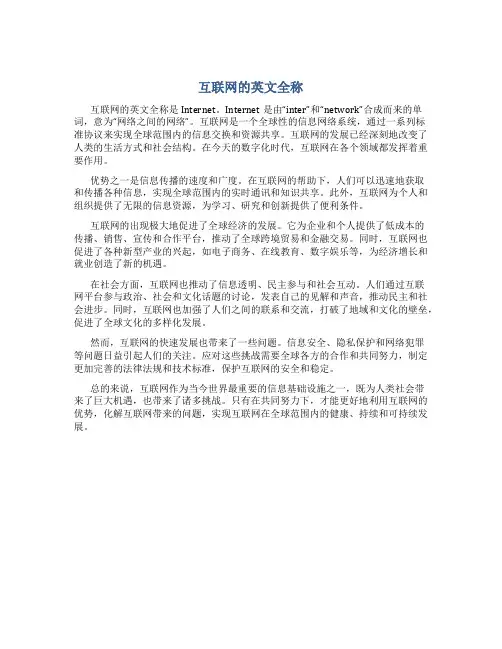
互联网的英文全称互联网的英文全称是Internet。
Internet是由“inter”和“network”合成而来的单词,意为“网络之间的网络”。
互联网是一个全球性的信息网络系统,通过一系列标准协议来实现全球范围内的信息交换和资源共享。
互联网的发展已经深刻地改变了人类的生活方式和社会结构。
在今天的数字化时代,互联网在各个领域都发挥着重要作用。
优势之一是信息传播的速度和广度。
在互联网的帮助下,人们可以迅速地获取和传播各种信息,实现全球范围内的实时通讯和知识共享。
此外,互联网为个人和组织提供了无限的信息资源,为学习、研究和创新提供了便利条件。
互联网的出现极大地促进了全球经济的发展。
它为企业和个人提供了低成本的传播、销售、宣传和合作平台,推动了全球跨境贸易和金融交易。
同时,互联网也促进了各种新型产业的兴起,如电子商务、在线教育、数字娱乐等,为经济增长和就业创造了新的机遇。
在社会方面,互联网也推动了信息透明、民主参与和社会互动。
人们通过互联网平台参与政治、社会和文化话题的讨论,发表自己的见解和声音,推动民主和社会进步。
同时,互联网也加强了人们之间的联系和交流,打破了地域和文化的壁垒,促进了全球文化的多样化发展。
然而,互联网的快速发展也带来了一些问题。
信息安全、隐私保护和网络犯罪等问题日益引起人们的关注。
应对这些挑战需要全球各方的合作和共同努力,制定更加完善的法律法规和技术标准,保护互联网的安全和稳定。
总的来说,互联网作为当今世界最重要的信息基础设施之一,既为人类社会带来了巨大机遇,也带来了诸多挑战。
只有在共同努力下,才能更好地利用互联网的优势,化解互联网带来的问题,实现互联网在全球范围内的健康、持续和可持续发展。
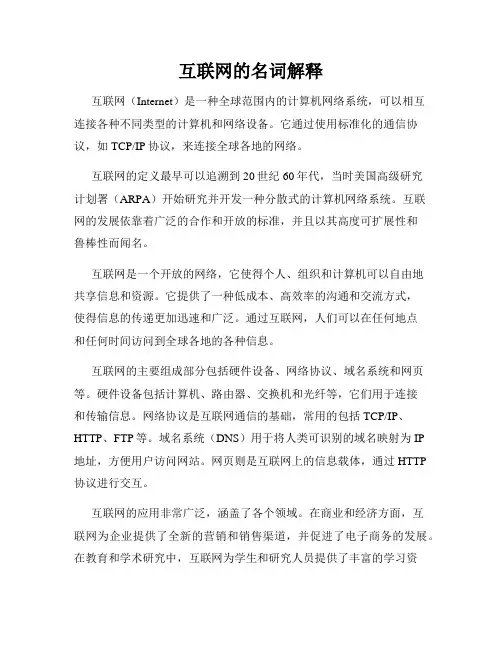
互联网的名词解释互联网(Internet)是一种全球范围内的计算机网络系统,可以相互连接各种不同类型的计算机和网络设备。
它通过使用标准化的通信协议,如TCP/IP协议,来连接全球各地的网络。
互联网的定义最早可以追溯到20世纪60年代,当时美国高级研究计划署(ARPA)开始研究并开发一种分散式的计算机网络系统。
互联网的发展依靠着广泛的合作和开放的标准,并且以其高度可扩展性和鲁棒性而闻名。
互联网是一个开放的网络,它使得个人、组织和计算机可以自由地共享信息和资源。
它提供了一种低成本、高效率的沟通和交流方式,使得信息的传递更加迅速和广泛。
通过互联网,人们可以在任何地点和任何时间访问到全球各地的各种信息。
互联网的主要组成部分包括硬件设备、网络协议、域名系统和网页等。
硬件设备包括计算机、路由器、交换机和光纤等,它们用于连接和传输信息。
网络协议是互联网通信的基础,常用的包括TCP/IP、HTTP、FTP等。
域名系统(DNS)用于将人类可识别的域名映射为IP地址,方便用户访问网站。
网页则是互联网上的信息载体,通过HTTP 协议进行交互。
互联网的应用非常广泛,涵盖了各个领域。
在商业和经济方面,互联网为企业提供了全新的营销和销售渠道,并促进了电子商务的发展。
在教育和学术研究中,互联网为学生和研究人员提供了丰富的学习资源和交流平台。
在娱乐和社交领域,互联网为人们提供了游戏、音乐、视频和社交媒体等多样化的娱乐方式。
然而,互联网也面临着一些挑战和问题。
互联网的快速发展带来了信息过载和虚假信息的泛滥,网络安全成为互联网发展的重要话题。
此外,隐私保护和个人信息安全也成为互联网用户关注的问题。
为了进一步推动互联网的发展,各国政府和国际组织一直在制定和推动相关政策和规范。
例如,联合国设立了互联网治理论坛,旨在促进各方分享经验和展示最佳实践。
互联网是当今信息社会的核心基础设施,它改变了人们的生活方式和社会结构。
随着技术的进步和应用的广泛推广,互联网的影响将继续扩大。
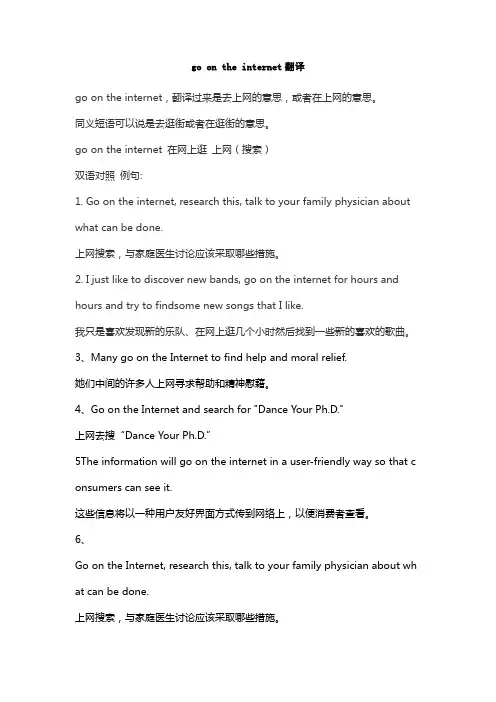
go on the internet翻译go on the internet,翻译过来是去上网的意思,或者在上网的意思。
同义短语可以说是去逛街或者在逛街的意思。
go on the internet 在网上逛上网(搜索)双语对照例句:1.Go on the internet, research this, talk to your family physician about what can be done.上网搜索,与家庭医生讨论应该采取哪些措施。
2.I just like to discover new bands, go on the internet for hours and hours and try to findsome new songs that I like.我只是喜欢发现新的乐队、在网上逛几个小时然后找到一些新的喜欢的歌曲。
3、Many go on the Internet to find help and moral relief.她们中间的许多人上网寻求帮助和精神慰藉。
4、Go on the Internet and search for "Dance Your Ph.D."上网去搜“Dance Your Ph.D.”5The information will go on the internet in a user-friendly way so that c onsumers can see it.这些信息将以一种用户友好界面方式传到网络上,以便消费者查看。
6、Go on the Internet, research this, talk to your family physician about wh at can be done.上网搜索,与家庭医生讨论应该采取哪些措施。
7、You can go on the internet and get certified for$ 15 or something. I thin k it is become less of an issue.你可以到互联网,取得认证,15美元,我认为那越来越不是个问题。
高二英语科技与互联网用语大全科技与互联网的快速发展已经成为当代社会的主要特征之一。
与此同时,英语作为全球通用语言,在科技与互联网领域中也扮演着重要角色。
本文主要介绍高二英语科技与互联网用语的大全,帮助读者更好地理解和应用这些词汇。
一、计算机与网络术语1. Computer(计算机)-一种可以根据指令进行计算的电子设备。
常用词汇包括keyboard(键盘)、monitor(显示器)、mouse(鼠标)等。
2. Internet(互联网)-一种将全球各地计算机网络连接起来的网络系统。
常用词汇有website(网站)、webpage(网页)、browser(浏览器)等。
3. Virus(病毒)-指在计算机系统中传播并对系统造成危害的恶意软件。
常见的病毒类型包括Trojan horse(木马病毒)和worm(蠕虫病毒)等。
4. Firewall(防火墙)-一种用于保护计算机网络安全的系统,可以监控和过滤网络传输的数据包。
二、电子邮件与通信用语1. Email(电子邮件)-电子邮件是一种通过互联网发送和接收邮件的通信方式。
邮件中常用的语言有subject(主题)、attachment(附件)等。
2. Chat(聊天)-通过即时通信软件进行在线交流的方式。
常用词汇包括message(消息)、conversation(对话)等。
3. Emoji(表情符号)-用于表达情感和附带信息的图形符号。
常见的表情符号有smiley face(笑脸)、heart(爱心)等。
4. Acronym(缩写词)-为了减少字符数和简化表达,常用词组被缩写为一串字母。
例如,“LOL”是“Laughing Out Loud”的缩写。
三、移动设备与应用程序用语1. Smartphone(智能手机)-一种功能强大的移动电话,带有多种应用程序和功能,例如短信、浏览器等。
2. App(应用程序)-一种可以在智能手机或平板电脑上运行的软件。
常见的应用程序有photo editing(照片编辑)、video streaming(视频流媒体)等。
如果您需要中文到英文的在线翻译服务,您可以尝试以下几种方式:
1. 谷歌翻译(Google Translate):提供多种语言之间的在线翻译服务,包括中文和英文。
2. 微软必应翻译(Bing Translator):微软公司提供的在线翻译工具,支持多种语言互译。
3. 有道翻译(Youdao Translation):网易旗下的在线翻译平台,提供中英互译和其他多语种翻译。
4. 百度翻译(Baidu Translate):百度公司的在线翻译服务,支持多种语言翻译。
5. 腾讯翻译君(Tencent QQ Tranlator):腾讯公司开发的在线翻译工具,支持多种语言互译。
6. DeepL翻译(DeepL Translator):使用人工智能技术进行翻译,被评价为准确度较高的在线翻译工具。
7. 汉程网:根据您的信息,这个网站也提供优质的在线翻译及英汉词典服务。
这些在线翻译工具大多数都提供了网页版,也有一些有手机应用版本。
需要注意的是,机器翻译虽然方便快捷,但有时可能无法像人工翻译那样准确捕捉语境和文化含义。
互联网英文名词互联网英文名词汇是指在涉及互联网和数字化领域时经常会遇到的专业术语或常用名词。
这些英文名词不仅仅在技术领域中使用,而且在日常生活和商业活动中也有广泛的应用。
下面将介绍一些常见的互联网英文名词及其简要解释。
1.AlgorithmAlgorithm是指一种用于解决特定问题或执行特定任务的有序步骤的计算程序。
在互联网领域中,算法被广泛应用于搜索引擎、推荐系统等方面。
2.Cloud ComputingCloud Computing是指通过互联网将计算任务和数据存储分配到多台远程服务器上的计算模式。
这种模式使得用户可以根据需求获取计算资源,无需自行购买和维护硬件设备。
3.CybersecurityCybersecurity指的是保护计算机系统、网络以及数据免受未经授权的访问、数据泄露或损坏的过程。
随着网络犯罪和数据泄露事件频发,网络安全问题备受关注。
4.Digital MarketingDigital Marketing是通过互联网和数字化技术进行产品和服务推广的营销方式。
数字营销可以通过搜索引擎优化、社交媒体等渠道实现品牌曝光和销售目标。
5.E-commerceE-commerce是电子商务的缩写,指的是通过互联网进行商品买卖交易的商业活动。
随着电子支付和物流技术的进步,电子商务在全球范围内蓬勃发展。
graphicInfographic是信息图表的缩写,是一种通过图表、图形和文字结合的方式将复杂信息清晰简洁地展示出来。
信息图表在网络传播和数据可视化领域得到广泛运用。
7.IoT (Internet of Things)IoT指的是物联网,是指各种物理设备、传感器和其他技术之间相互连接和共享数据的网络。
物联网技术正在改变我们的生活方式和工作环境。
8.Online PrivacyOnline Privacy指的是在互联网上保护个人信息和数据安全的一种措施。
随着个人隐私泄露和数据滥用现象增多,网络隐私保护成为重要关注点。
互联网的英文是什么互联网,通常被称为网际网络(Internet),是由全球各地数以亿计的设备所组成的巨大网络。
它是一个连接世界各地的计算机网络,允许人们通过各种设备进行信息交流、数据传输和资源共享。
互联网的英文是Internet,源自“international network”这个词组的缩写。
互联网的起源与发展互联网的起源可以追溯到20世纪60年代末和70年代初,当时美国国防部高级研究计划署(ARPA)启动了一个名为“阿帕网”(ARPANET)的项目,旨在建立一个去中心化的网络系统,以便在军事和学术机构之间共享信息。
随着时间的推移,互联网逐渐发展成为今天普及的全球性网络。
在1990年代,随着万维网的发展,互联网开始迅速向全球扩张。
人们可以通过浏览器访问网页、发送电子邮件、参与在线社交和购物等活动。
互联网的普及改变了人们的生活方式、商业模式和社会交往方式,成为人类社会不可或缺的一部分。
互联网的基本构成互联网是由许多相互连接的计算机网络组成,其中的关键要素包括:•主机:连接到互联网的计算机设备,例如个人电脑、智能手机、服务器等。
•路由器:用于在网络间传输数据包的设备,协助数据在网络中的传输和路由。
•协议:各种网络协议如TCP/IP、HTTP等,用于规定数据传输的规则和格式。
•域名系统(DNS):将域名转换为对应的IP地址,使用户能够通过易记的名称访问网站。
互联网的影响与挑战互联网的普及为社会带来了许多积极影响,包括提高信息获取的便利性、促进全球间的交流与合作、推动创新和科技进步等。
然而,互联网也面临许多挑战,如网络安全、隐私泄露、信息泛滥、网络暴力等问题,需要人们共同努力来解决。
互联网的未来展望在科技不断发展的时代,互联网仍将扮演重要角色,随着物联网、5G等技术的发展,互联网将呈现更高效、更智能的状态。
未来的互联网将更好地满足人们对信息的需求,促进人类社会的进步和发展。
结语互联网作为当今社会最重要的信息基础设施之一,影响着人们的生活方式、工作方式和社会文化。
What is the Internet?The Internet has become an integral part of modern life, connecting people, information, and resources in ways that were once unimaginable. But what exactly is the Internet?At its core, the Internet is a vast global network of interconnected computers that communicate with each other using a common set of protocols. These protocols allow computers to exchange data and information, creating a seamless web of connectivity that spans the globe.The Internet enables users to access a wide array of services and resources, including websites, email, online shopping, social media, and more. It serves as a platform for communication, collaboration, and information sharing, bringing people together regardless of geographical boundaries.One of the key features of the Internet is its decentralized nature. Unlike traditional communication networks, the Internet is not controlled by a single entity or organization. Instead, it is a distributed network of interconnected nodes that work together to ensure data can flow freely between devices. This decentralized structure has contributed to the Internet’s resilience and ability to adapt to changing circumstances.In addition to connecting devices and users, the Internet also plays a crucial role in driving innovation and economic growth. It serves as a platform for businesses to reach customers, for researchers to collaborate on projects, and for individuals to access a wealth of information and resources.As technology continues to evolve, the Internet continues to evolve along with it, adapting to new devices, services, and applications. It has become an essential tool for modern life, shaping the way we communicate, work, and interact with the world around us.In conclusion, the Internet is a dynamic and ever-evolving network that connects people, information, and resources across the globe. It has revolutionized the way we access and share information, enabling new forms of communication and collaboration. As we look to the future, the Internet will continue to play a central role in shaping the digital world and connecting people in ways we never thought possible.。
互联网英语翻译Internet is a global network that connects millions of computers and allows them to communicate with each other. It has completely transformed the way we live, work, and interact with others. Internet has become an indispensable part of our daily lives and has revolutionized various industries, including education, business, and entertainment.The Internet has greatly facilitated the exchange of information. With just a few clicks, we can access a vast amount of information on any topic imaginable. This has drastically changed the way we learn and gather knowledge. Gone are the days when we had to rely solely on books and libraries. Now, we can search for information anytime and anywhere, making education more accessible and convenient.In addition to education, the Internet has also revolutionized the way businesses operate. E-commerce has rapidly grown in popularity, allowing businesses to reach a global audience and sell their products and services online. This has opened up new opportunities for small businesses and entrepreneurs to thrive, as they no longer have to rely on physical stores to reach customers. Online marketplaces have also made it easier for consumers to compare prices and find the best deals.Furthermore, the Internet has transformed the entertainment industry. We can now stream movies, TV shows, and music directly to our devices, eliminating the need for physical media. Social media platforms have also become a popular source of entertainment, offering us a way to connect and share with friendsand family, as well as discover new content. The rise of online gaming has created a whole new form of entertainment, bringing people from all over the world together to compete and collaborate in virtual worlds.However, along with its numerous benefits, the Internet also brings about challenges and concerns. Online security and privacy have become major issues as more and more personal information is shared online. Cybercrime, such as hacking and identity theft, poses a significant threat to individuals and businesses alike. The spread of misinformation and fake news has also become a pressing issue, as it can easily reach a wide audience and influence public opinion.In conclusion, the Internet has dramatically transformed our livesin the past few decades. Its impact on education, business, and entertainment cannot be overstated. It has made information more accessible, allowed businesses to reach a global audience, and revolutionized the way we entertain ourselves. However, it also comes with potential risks and challenges that need to be addressed. As the Internet continues to evolve, it is important for individuals, businesses, and governments to adapt and ensure its responsible and safe usage.。